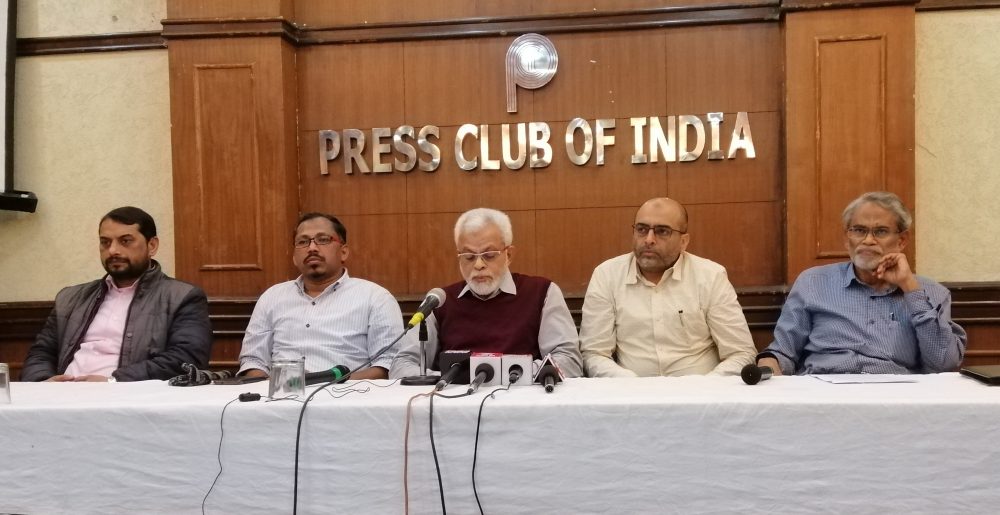By Pervez Bari
NEW DELHI: The Muslim Political Conclave, which was convened on March 6th, 2019 in New Delhi by the Popular Front of India, (PFI), has urged all the political parties which are concerned with minority rights to respond positively and include those demands in their election manifesto.
The conclave has also appealed to the people, especially minority community voters to watch and evaluate the response of contesting political parties and candidates to this Charter of Demands while exercising their franchise in 2019 Lok Sabha election. As a follow up of the Conclave, efforts will be taken to include these Charter items in the agenda of political parties and to make the voters alert about their rights. A work plan is being prepared for intensive campaigning through distributing pamphlets, convening people’s conventions etc. in 100 Lok Sabha constituencies where minority votes are decisive.
Addressing a joint Press Conference here on Thursday E. M. Abdul Rahiman, Convenor of the Conclave and Member, National Executive Council, (PFI), and E. Abubacker, Chairman PFI said that the Conclave was convened in the context of forthcoming Lok Sabha election and was attended by intellectuals, scholars and community leaders belonging to different social and political backgrounds and representing different states. They took stock of the current political scenario, discussed the issues before the nation and resolved to the forefront the concerns of the minorities, particularly Muslims. The conclave concluded with adopting a charter of demands which covers the developmental, representational, educational, cultural, security and other issues pertaining to the Muslim community.
Abdul Rahiman informed that the Charter points out that under the present NDA government led by BJP and controlled by RSS; the religious minorities were targeted and discriminated. Instead of politics of justice to all, politics of hate was the policy of the ruling regime. Hence a change of government with the coming election is in the interest of religious minorities. At the same time, the existential and developmental issues of minorities have been largely sidelined by major non-BJP parities also, who traditionally depend on Muslim votes. Hence, a mere change of ruling party or coalition without a change of government policy is not the desired alternative. In order to become the right alternative to BJP, the policy of other parties should be replaced with a pro-people and secular approach to various issues.
The charter cites several issues such as Babri Masjid, representation, anti-people laws etc. in which the Opposition parties either extend soft support or maintain studied silence at par with the communal and casteist approach of BJP. Total 73 demands under 25 schemes pertaining to burning problems of the people, particularly the minority Muslim community are listed in the Charter. These demands are mainly related to the Sachar Committee and Misra Commission recommendations, minority welfare schemes, skilled workers and artisans, repressive laws, NRC exercises and Citizenship Amendment moves, encounter killings, under-trial prisoners, proportionate representation, reservation to religious minorities, minority institutions, Muslim personal law, places of worship, Waqf, women empowerment etc.
Meanwhile, it may be mentioned here that Popular Front Chairman Abubacker presided over the conclave. He stated that the electoral role of Muslims has been confined to either bringing a particular party to power or ousting another party from power in every successive election. But no party is bothered about addressing their issues. Now, the onus of defeating BJP has also been put only on the shoulders of Muslims by the inhabitants in the divided house of secular parties. He emphasized that it is high time the depressed classes think about ensuring their due share in power, instead of remaining as passive voters of different parties. E.M. Abdul Rahiman was the moderator. Dr. Taslim Rahmani presented the draft of the charter of demands. M. Mohammad Ali Jinnah welcomed the gathering and Abdul Wahid Sait proposed a vote of thanks.
Others who were present in the press conference on Thursday included M. Mohammad Ali Jinnah, General Secretary, and Abdul Wahid Sait, Secretary, of PFI together with Parvez Ahmed, Delhi State President, PFI.

